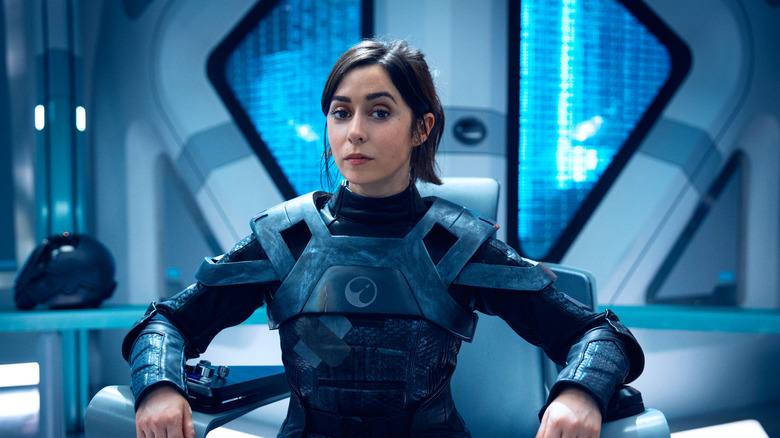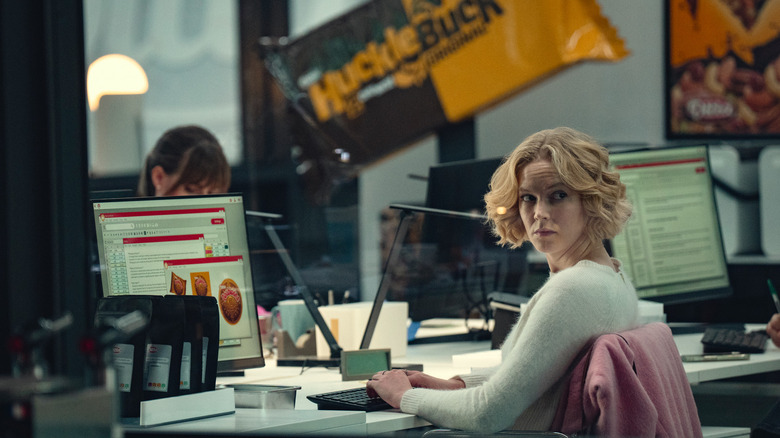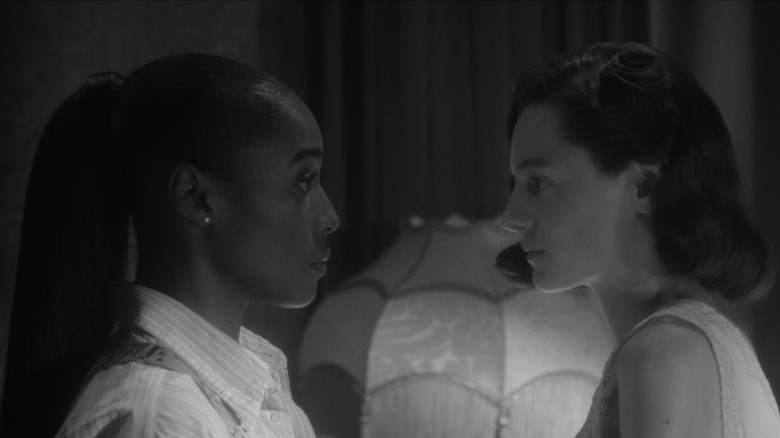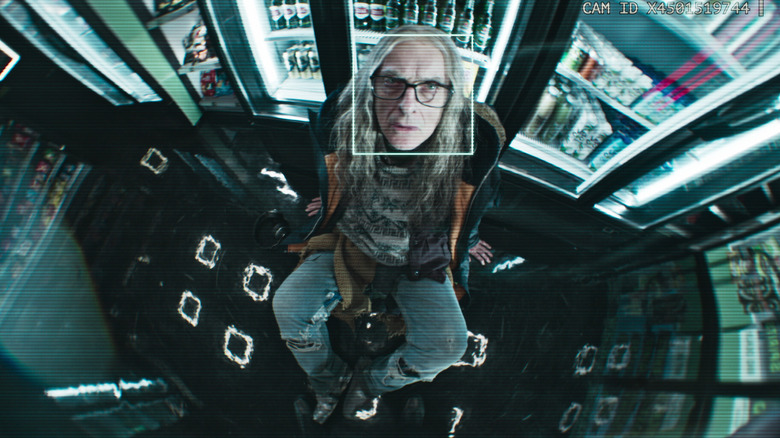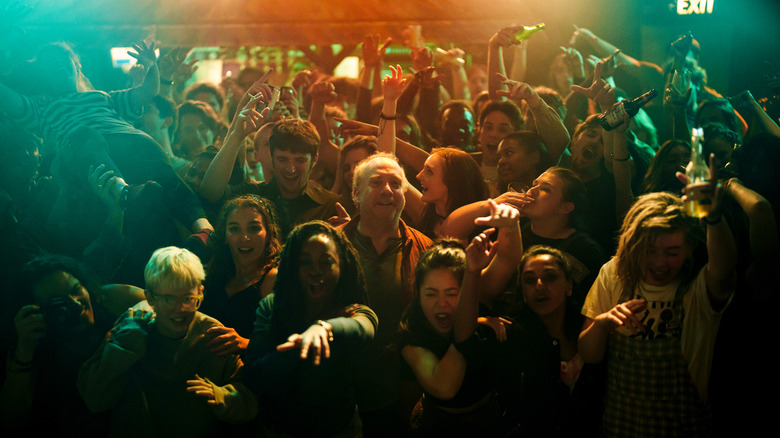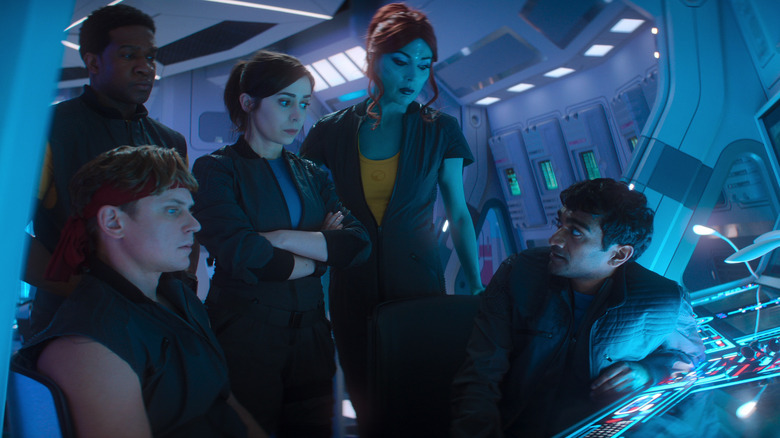Black Mirror Season 7 Review: Disappointing Stories Suggest This Netflix Series Is Out Of Ideas
Since 2011, Charlie Brooker's sci-fi/horror/comedy/whatever-you-want-it-to-be anthology series "Black Mirror" has had a firm hold on pop culture, a fact that was only heightened when the series made the leap to Netflix in season 3. But a curious thing happened: as the real world grew increasingly more surreal and strange, the far-out concepts of "Black Mirror" struggled to keep up. When we're living in a modern world where we're cursed to hear about the banal evil of Elon Musk and something called "Fartcoin" every single damn day, the running "Black Mirror" question asking "Eh bruv, wot if your mobile phone killed you?" starts to feel kind of silly.
Of course, no one is saying that "Black Mirror" has to accurately reflect our current weird times (although that does seem to be Brooker's whole deal with the show) as long as it tells compelling stories. Unfortunately, the series has struggled to sustain itself over the years, and as we arrive at season 7, it's really starting to seem like there's nothing left for "Black Mirror" to say. True, every now and then the show still produces a fun installment — season 6's "Joan is Awful" was memorable, for instance. But every time a new season rolls around, I can't help but think "Black Mirror" has already gone as high is it can go and will never, ever top it's finest moment, season 3's absolutely wonderful "San Junipero." In fact, "San Junipero" is starting to feel like an outlier. While the majority of "Black Mirror" stories are bitter, cruel, and end on rather bleak notes, that installment gave its characters a happy conclusion. I'm not saying that all "Black Mirror" stories should follow suit and end on upbeat notes, but it's not such a bad idea, especially when you sit down and watch the first episode of season 7, the relentlessly hopeless "Common People."
Due to the nature of the show — it's an anthology, and while there's some connective tissue, the stories mostly stand on their own — I'll be approaching this "Black Mirror" season 7 review episode by episode. Ultimately, this might be the weakest season the show has produced so far, even though there are occasional flashes of something greater lurking in the mess.
Common People is the bleakest the show has ever been
As any Luigi Mangione fan can tell you, the American health care industry is a labyrinthine nightmare of misery meticulously designed to screw over the most vulnerable, so it makes sense that "Black Mirror" would eventually devote an episode to the horrors of mounting medical bills. But "Common People," penned by Brooker and directed by Ally Pankiw, is so relentlessly nasty that it starts to feel like parody. By the time the episode reached its cruel conclusion, I was ready to bail on the entire season before it even got started.
Amanda (Rashida Jones) and her husband Mike (Chris O'Dowd) are a working class couple hoping to start a family soon. Things take a turn, however, when a medical emergency threatens Amanda's life. Enter Gaynor (Tracee Ellis Ross), a woman who works for a tech-health company. Via some poorly described software, Amanda essentially has a wifi signal implanted in her head that will keep her going, but there are a few catches: she can't travel very far from home, she needs to sleep longer, and suddenly, she starts spouting off about products (and then has no memory of doing so). As Gaynor explains, all this product talk is because Amanda and Mike have the basic plan, which comes with ads. If Amanda wants to be ad-free (and she very much does), the couple will have to upgrade — and upgrades are expensive. Soon, Mike is resorting to desperate measures to make more money while the couple remains precariously close to financial ruin.
The ideas here are sound — I found the ad-based problem the couple faces particularly amusing in a "That would totally happen if this were real" sort of way. But as "Common People" ticks on, things grow so dire and mean that you start to wonder why you're watching it at all. In the end, the episode has nothing more to say other than "Isn't this situation f***ed up?" It is, but we need something more than that.
Bête Noire is the best episode of season 7 ... until the ending ruins it
The best episode of the season comes via "Bête Noire," directed by Toby Haynes. Pity, then, that the final moments (don't worry, I won't spoil them) completely muck up everything that came before. Up until these few concluding minutes, I was having a blast with what writer Brooker had cooked up here. Then everything fizzled.
Maria (Siena Kelly) is a culinary genius working for a company that makes fancy candy bars, and her star is on the rise thanks to her innovative confections. Enter Verity (Rosy McEwen), a woman Maria used to go to school with. As Maria explains, Verity was an outcast at school — relentlessly bullied and mocked. Now, however, Verity seems to have her life together, and when she lands a job at Maria's company she quickly becomes much-liked by her coworkers. But something is off about Verity, although Maria has a hard time explaining what, exactly, that is.
Without dipping into spoiler territory, I'll just say that "Bête Noire" plays around with the idea of the Mandela Effect, wherein people seem to collectively misremember certain historical events. Maria starts to come unhinged as the world around her is drastically altered, and she's convinced Verity is the cause. The build-up here is wonderful, and Kelly does a great job conveying Maria's increasing horror. But "Bête Noire" falters when it feels the need to explain how any of this is happening, and ends on a rather silly note that completely torpedoes any point the story was trying to make. Bummer.
Hotel Reverie wants to be the new San Junipero, and fails
As I said above, "San Junipero" remains the best thing "Black Mirror" has ever done. Brooker and company seem to know that, too, since the series has been trying to recreate the magic of that installment ever since. "Hotel Reverie" is season 7's attempt at a "San Junipero"-style story, and it utterly fails. It's a shame, too, because the story has potential, especially in the way it presents deep fake technology related to entertainment. Movies and TV shows using AI to resurrect the dead is a hot-button issue, and while that scenario is at the center of "Hotel Reverie," Brooker's script ultimately seems uninterested in investigating it. It only wants to use the idea to springboard a rather bland story.
Awkwafina plays an tech exec teaming up with a UK film studio to produce a remake of one of their classics, "Hotel Reverie." But this is no normal remake. Using cutting-edge technology, the production will virtually recreate the world of the film and insert a modern-day actor into the action. That modern-day actor is Brandy Friday (Issa Rae), who finds herself dropped into the black-and-white setting of the movie and acting against Dorothy (Emma Corrin), a long-dead film star of yesteryear.
While recreating the love story of the film, Brandy finds herself falling for Dorothy, a tricky situation since Dorothy only exists in the virtual movie world the remake has conjured up on a computer. There's some fun to be had here as Brandy tries to navigate the action of the film, and Corrin is quite good at recreating the poise of a classic starlett. But unfortunately, Rae and Corrin lack the chemistry that Gugu Mbatha-Raw and Mackenzie Davis so effortlessly had in "San Junipero." Indeed, Rae feels completely at sea with this material, and the episode's stabs at humor fall flat, as does an attempt at a poignant ending.
Plaything is silly and undercooked
The silliest installment of the season is "Plaything," which briefly brings back Will Poulter's weirdo game developer from the interactive "Black Mirror" special "Bandersnatch," but mostly consists of Peter Capaldi wearing a bad wig and telling a story about a video game that's not really a video game. Instead, it's an entire virtual world, full of cute sentient creatures. And the only way Capaldi's character can communicate with these creatures is by taking insane amounts of LSD.
Sure, why not!
Look, I don't have a problem with the show getting silly. But "Plaything" also feels incredibly undercooked, as if Brooker didn't put much thought into it beyond writing "hallucinogenic drugs+video games=?" on a white board and calling it a day. The video game creatures are pretty cute, though.
Eulogy features a very good Paul Giamatti performance
At the very least, "Eulogy" is probably worth watching for Paul Giamatti. One of the best to ever do it, Giamatti is excellent here as Phillip, a lonely man who learns that an old girlfriend has died. Phillip has been asked to contribute to the dead woman's eulogy, and using some tech, he's able to literally revisit the past by stepping into old photographs. But the relationship ended on a sour note, and Phillip finds himself dealing with painful memories he has kept buried for years.
On the surface, this is a strong idea, but "Eulogy," which Brooker wrote with Ella Road, suffers from a kind of predictability — we know exactly where this is going, even if Phillip takes a longer time to get there. Still, Giamatti is dependably strong here as Phillip goes through a whirlwind of emotions dealing with the past. I also enjoyed the unique visual style directors Chris Barrett & Luke Taylor create as Phillip keeps entering various photos. I just wish it all amounted to something better.
USS Callister: Into Infinity is the sequel nobody needed
The first full-blown "Black Mirror" sequel, "USS Callister: Into Infinity" can also be considered a "Black Mirror" movie, since it clocks in at feature-length. Sadly, the end result feels rather pointless and surely could've been much shorter. The season 4 episode "USS Callister" was a dark "Star Trek" parody in which a sociopathic game guru (played by the always-welcome Jesse Plemons) digitally cloned some of his coworkers and forced the poor clones to live out his fantasy of recreating his favorite sci-fi TV show, the "Trek" knock-off "Space Fleet."
The episode ended with the crew rebelling against their cruel captain, led by Nanette (Cristin Milioti), who took over captain duties after Plemons' character, Robert Daly, was defeated (and killed). The crew then found themselves escaping into a virtual galaxy, and honestly, that was a pretty good ending on its own. The sequel, "Into Infinity," focuses on what comes next, as Nanette and her fellow imprisoned clones try to survive a universe full of violent gamers who want to kill them. Meanwhile, out in the real world, the real Nanette begins to learn the full extent of what Daly did.
Despite some new twists and turns and serious star power via the very talented Milioti, "USS Callister: Into Infinity" never justifies returning to these characters, and the jokey conclusion feels particularly bland. And "bland" ultimately sums up "Black Mirror" season 7 as a whole. Maybe it's time to power this device down.
/Film Rating: 5 out of 10
"Black Mirror" season 7 premieres on Netflix April 10, 2025.
